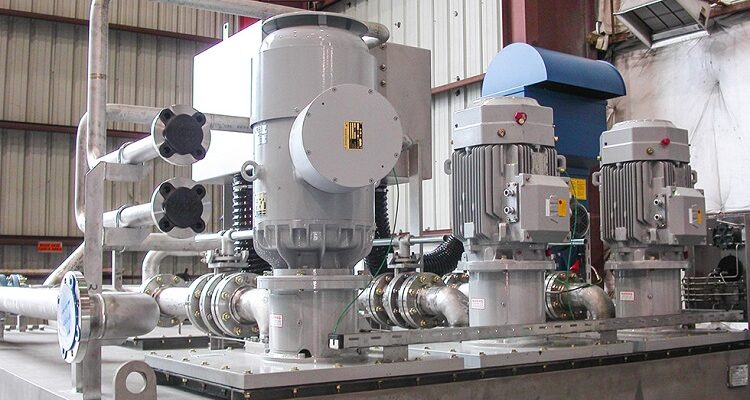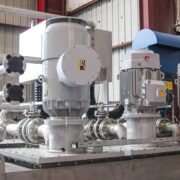When it comes to heavy machinery, maintaining optimal performance and reducing wear and tear are top priorities. The backbone of effective maintenance? Lube oil pumps. These essential components keep machinery operating smoothly by ensuring consistent lubrication of critical components. Without them, machinery would face frequent downtimes, costly repairs, and significantly reduced lifespan.
This blog dives into the role of lube oil pumps, their importance in heavy machinery, and why investing in high-quality gear oil pumps can save you time and money in the long run. Stay with us for expert insights!
Table of Contents
What Are Lube Oil Pumps and How Do They Work?
Lube oil pumps serve as the heart of a lubrication system. Their primary function is to circulate oil to lubricate the moving components and reduce friction, heat, and wear in heavy equipment. Typically driven by gears or an electric motor, these pumps deliver a constant flow of oil under pressure, ensuring that all critical parts—like bearings, gears, and pistons—receive sufficient lubrication.
Key Components of a Lube Oil Pump
- Pump Housing: Protects the internal components and contains the oil under pressure.
- Gears or Impellers: Help draw oil into the pump and push it through the system.
- Relief Valves: Prevent over-pressurization, ensuring the pump operates within safe parameters.
- Filters: Remove contaminants from the oil before it reaches the machinery.
By combining precision engineering with hydraulic principles, lube oil pumps are the unsung heroes behind the flawless operation of heavy equipment.
Why Are Lube Oil Pumps Critical in Heavy Machinery?
The importance of lube oil pumps goes beyond simply reducing friction. They play a vital role in maintaining system efficiency, preventing equipment failures, and improving the operational lifespan of your machinery. Here’s why these pumps are indispensable:
1. Maintains Optimal Equipment Performance
Heavy machinery often operates under extreme conditions, with high loads and intense heat. Without adequate lubrication, components are prone to overheating and seizing up. Lube oil pumps ensure consistent oil distribution, reducing inefficiencies and keeping machinery running at peak performance.
2. Reduces Wear and Tear
Machinery components experience constant stress and motion. Over time, this creates wear and tear that can disrupt operations and lead to expensive repairs. By providing a steady oil flow, lube oil pumps form a protective layer between moving parts, minimizing direct contact and wear.
3. Prevents Downtime
Unplanned equipment failures due to inadequate lubrication can lead to downtime, causing disruptions in production schedules. Reliable lube oil pumps keep machinery functioning smoothly, ensuring operations run seamlessly and mitigating costly interruptions.
4. Extends Machinery Lifespan
Regular lubrication dramatically reduces the deterioration of machinery components. By preventing excessive wear and controlling heat, lube oil pumps help extend the operational life of equipment, reducing the need for replacements.
5. Enhances Safety
Overheated machinery or compromised components can create hazardous conditions. Proper lubrication minimizes the risks associated with component damage, protecting both equipment and personnel.
Gear Oil Pumps vs. Standard Lube Oil Pumps
While both lube oil pumps and gear oil pumps perform similar functions, they are designed to serve different applications. Understanding their differences can help ensure you pick the right system for your machinery.
Lube Oil Pumps
- Purpose: Primarily used for circulating lubrication oil across various machinery components.
- Applications: Bearings, pistons, turbines, and compressors.
- Key Advantage: Versatility across multiple industries, from manufacturing to automotive.
Gear Oil Pumps
- Purpose: Specifically designed for high-viscosity oil, such as gear oil, which is thicker and provides more robust protection.
- Applications: Geared systems like gearboxes and automotive differentials.
- Key Advantage: Superior ability to handle thick fluids without clogging or losing pressure.
Selecting between the two depends on the specific requirements of your machinery. For general lubrication, a standard lube oil pump suffices. Gear oil pumps provide better efficiency and performance for systems requiring high-viscosity oils.
How to Choose the Right Lube Oil Pump for Your Equipment
When choosing a lube oil pump, it’s important to consider factors like compatibility, performance requirements, and cost-effectiveness. Here are several tips:
1. Understand Your Equipment’s Needs
Analyze your equipment’s lubrication requirements. Does your machinery operate with standard or high-viscosity oil? How much flow rate and pressure are needed? Identifying these parameters will ensure you select a pump that meets your needs.
2. Check for Durability
Choose pumps made from high-quality materials that are resistant to wear and corrosion. Heavy-duty applications require pumps that can withstand continuous operation under demanding conditions.
3. Choose Energy-Efficient Options
Energy efficiency directly impacts operational costs. Opt for pumps designed to minimize power consumption without compromising performance.
4. Evaluate Maintenance Costs
Look for pumps with built-in features like filters and relief valves that simplify maintenance. Lower maintenance costs translate to long-term savings.
5. Partner with Trusted Suppliers
Work with reputable suppliers or manufacturers who offer reliable products, technical support, and adequate warranties to ensure peace of mind.
Maintenance Tips for Lube Oil Pumps
Proper maintenance ensures the longevity and reliability of your lube oil pump. Here are a few best practices:
- Monitor and Replace Filters Regularly to prevent clogging and maintain consistent oil flow.
- Inspect Pump Components for wear and damage during periodic equipment checks.
- Ensure Proper Alignment to avoid unnecessary stress on the pump and reduce vibrations.
- Use High-Quality Oil compatible with your machinery to enhance lubrication efficiency.
- Follow the Manufacturer’s Recommendations for cleaning and servicing to keep your pump in top shape.
By following these practices, you minimize the risk of pump failure and maximize the overall performance of your equipment.
The Future of Lube Oil Pumps
Thanks to ongoing advancements in technology, lube oil pumps are becoming even more efficient, durable, and eco-friendly. Innovations like smart sensors and IoT integration enable predictive maintenance, allowing operators to monitor pump performance in real-time and detect potential issues before they become critical.
Additionally, the push for sustainable solutions is encouraging manufacturers to develop pumps that consume less energy and are compatible with eco-friendly lubricants. Whether it’s automation or sustainability, the future of lube oil pumps looks promising.
Choosing Reliability for Long-Term Success
Investing in high-quality lube oil pumps is not just a maintenance consideration—it’s a strategic decision that impacts your machinery’s efficiency, lifespan, and overall safety. Whether you operate industrial equipment, heavy vehicles, or manufacturing systems, understanding the role of lube oil pumps ensures fewer breakdowns and more effective operations.
By making informed choices and partnering with trusted suppliers, you set the foundation for long-term success in optimizing your machinery. Take your next step toward smoother operations with high-quality lube and gear oil pumps designed to meet your needs.



















Comments